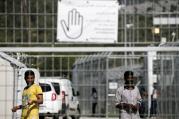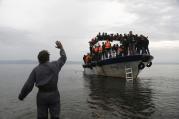Loading...
Click here if you don’t see subscription options
Click here if you don’t see subscription options
Dispatches
April 15, 2016
“I got here thanks to Allah,” said Munir, whose son was killed in Syria.
Dispatches
April 15, 2016
More than half a million refugees have passed through Lesbos over the past year.
Vatican Dispatch
April 14, 2016
Pope Francis is on record as saying that the future of the church is in Asia.
Signs Of the Times
April 14, 2016
In his post-synodal apostolic exhortation on the family, “Amoris Laetitia” (“The Joy of Love”), Pope Francis not only strongly affirms the traditional Christian ideal of marriage; he also opens doors to the progressive integration into the life of the church of those Catholic
Dispatches
April 12, 2016
Pope Francis has appointed the French-born Archbishop Christophe Pierre, one of the Holy See’s most distinguished and respected diplomats.
Faith Synod on the Family
April 08, 2016
Cardinal Schönborn: “There is continuity in teaching here, but there is also something really new.”
Synod on the Family
April 08, 2016
Integration requires discernment, but the doors are open, even to the sacraments.
Dispatches
April 05, 2016
The pope plans to visit the Greek island of Lesbos in mid-April.
Dispatches
April 03, 2016
Christians are called to be apostles of the mercy which seeks to encounter all forms of poverty and to free this world of so many types of slavery.
Dispatches
April 03, 2016
Drawing attention to the ongoing violence in Ukraine, Pope Francis called for a special collection in all of the Catholic churches in Europe.










